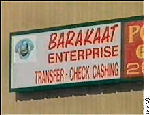 On August 24, OFAC announced the removal of Yusaf Ahmed Ali from the list of Specially Designated Nationals. This might lead you to wonder how this could happen. How could Mr. Ali be a terrorist one day and not a terrorist the next? Did he cut up his Al-Qaeda card and send it back to Pakistan?
On August 24, OFAC announced the removal of Yusaf Ahmed Ali from the list of Specially Designated Nationals. This might lead you to wonder how this could happen. How could Mr. Ali be a terrorist one day and not a terrorist the next? Did he cut up his Al-Qaeda card and send it back to Pakistan?
Actually the answer appears to have been that he may never have been a terrorist in the first place.
Mr. Ali, a Somali resident of Sweden, was added to the S.D.N list on November 7, 2001, along with a number of other individuals and companies believed to be connected with Al-Qaeda and the attack on the World Trade Center. One of the designated companies was the al-Barakaat network, a money transfer company that had been involved in the transfer of funds to and from Osama Bin Laden. Mr. Ali was listed because he worked for a storefront operated by the al-Barakaat network in Sweden.
Additionally, two other Somali co-workers of Mr. Ali were added to the SDN list. The three were shortly thereafter added to the U.N. sanctions list which caused them to become subject to sanctions in Sweden. This meant it was illegal for the three to rent living quarters, be paid a salary, open a bank account, have a cellphone or engage in any financial transactions in Sweden (or anywhere else in the world).
Mr. Ali and his co-workers claimed that they had no knowledge of, or connection to, terrorism and that they were simply employees who assisted al-Barakaats in its legitimate money transfer business. The al-Barakaats network was the principal service used by Somalis to send funds to their families in Somalia after the collapse of the Somalian banking system.
Johan Hakelius — the editor of Finanstidningen, a Swedish financial journal — believed the three men and interceded on their behalf. Due to Mr. Hakelius’s efforts, and in violation of Swedish law, a legal defense fund was raised for the three. A case was brought on their behalf before the European Court of First Instance alleging that the designation violated their rights to due process. That case was dismissed on May 7, 2002.
The Swedish government also became involved. Swedish intelligence requested to see the evidence against Mr. Ali and his two co-workers and, based on what was supplied to it by the U.S. government, concluded that the evidence against the three men was insufficient. As a result, the Swedish government began pressuring the United States to remove Mr. Ali and his colleagues from the list.
In August 2002, the U.S. agreed and Mr. Ali’s colleagues were removed from the U.N list and the S.D.N. list The U.S. however maintained that there were “unresolved questions” relating to Mr. Ali and declined to delist him. The Swedish government continued to lobby for Mr. Ali’s removal and, finally, as evidenced by OFAC’s recent action, the U.S. agreed.
This case illustrates the potential injustice that may be visited upon those persons mistakenly added to the SDN list. First, the designated person has no due process rights to object to the designation prior to it becoming effective. Second, once designated, all the party’s funds are blocked and he has no money to pay a lawyer to challenge the OFAC designation. Even if he did, the lawyer can only be paid if a license is issued by OFAC authorizing that payment. And in the interim, if he is living in a country that enforces U.N. sanctions his daily life becomes nearly impossible.
UPDATE: Johan Hakelius left a comment clarifying the role that others in Sweden also played with respect to the three designated Somalians.
 Permalink
Permalink
Copyright © 2006 Clif Burns. All Rights Reserved.
(No republication, syndication or use permitted without my consent.)

 Posted by
Posted by  Category:
Category: 

